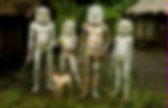

Muddy succession. Papua New Guinea profile - Overview. Papua New Guinea occupies the eastern part of the world's second largest island and is prey to volcanic activity, earthquakes and tidal waves.
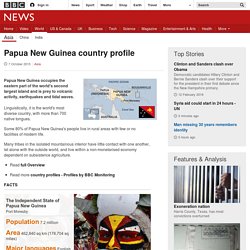
Linguistically, it is the world's most diverse country, with more than 700 native tongues. Some 80% of Papua New Guinea's people live in rural areas with few or no facilities of modern life. Many tribes in the isolated mountainous interior have little contact with one another, let alone with the outside world, and live within a non-monetarised economy dependent on subsistence agriculture. Population 7.2 million Area 462,840 sq km (178,704 sq miles) Major languages English, Tok Pisin, Hiri Motu Major religions Christianity, indigenous beliefs Life expectancy 61 years (men), 66 years (women) Currency kina Getty Images Head of state: Queen Elizabeth II, represented by a Governor-General.
Prime minister: Peter O'Neill Image copyright Getty Images Read full profile The government operates a national network and provincial stations. Read full timeline. World Directory of Minorities and Indigenous Peoples - Papua New Guinea : Overview. Environment Papua New Guinea consists of the eastern half of the mountainous island of New Guinea, plus more than 50 populated islands, extending eastwards to the island of Bougainville in the Solomon Islands chain.
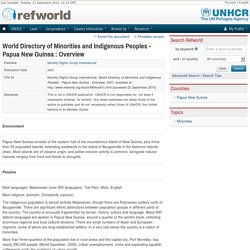
Most islands are of volcanic origin, and active volcanic activity is common, alongside natural hazards ranging from frost and floods to droughts. Peoples Main languages: Melanesian (over 800 languages), Tok Pisin, Motu, English Main religions: animism, Christianity (various) The indigenous population is almost entirely Melanesian, though there are Polynesian outliers north of Bougainville. More than three-quarters of the population live in rural areas and the capital city, Port Moresby, has nearly 290,000 people (World Gazetteer, 2006). History Melanesians were established in New Guinea at least 40,000 years ago. Regional dissent was also strong in central Papua, whose identity was a colonial creation. Governance. PAPUA NEW GUINEA: Indigenous people lose out on land rights. PNG is home to hundreds of indigenous ethnic groups PORT MORESBY, 1 June 2010 (IRIN) - Papua New Guinea’s indigenous people have lost their right to challenge developers and the state over deals involving their land and resources.
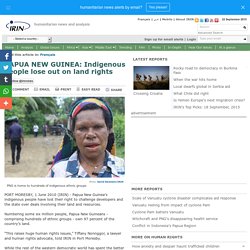
Numbering some six million people, Papua New Guineans - comprising hundreds of ethnic groups - own 97 percent of the country’s land. “This raises huge human rights issues,” Tiffany Nonnggor, a lawyer and human rights advocate, told IRIN in Port Moresby. While the rest of the western democratic world has spent the better part of the past 50 years trying to restore indigenous property rights, this government “has just stripped its most vulnerable citizens, those in the remote rural areas where the projects are, of their rights with no consultation and debate, let alone compensation”, she said. “National interest” The opposition is up in arms over the amendments, saying the changes were open to legal challenge to determine their constitutionality. Rights removed. West Papua: Forgotten War, Unwanted People.
Nowhere in the modern world has an armed liberation struggle persisted for so long - nearly 30 years - and with such secrecy, as the West Papuan war of resistance against the military government of Indonesia.
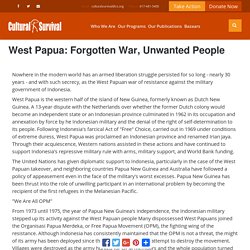
West Papua is the western half of the island of New Guinea, formerly known as Dutch New Guinea. A 13-year dispute with the Netherlands over whether the former Dutch colony would become an independent state or an Indonesian province culminated in 1962 in its occupation and annexation by force by he Indonesian military and the denial of the right of self-determination to its people. Following Indonesia's farcical Act of "Free" Choice, carried out in 1969 under conditions of extreme duress, West Papua was proclaimed an Indonesian province and renamed Irian Jaya. Through their acquiescence, Western nations assisted in these actions and have continued to support Indonesia's repressive military rule with arms, military support, and World Bank funding.
"We Are All OPM" A Mass Exodus Note. Papua New Guinea's Mud Men - Darts. Indigenous People Aboriginal Music Part 1. Wildlife protection and cultural preservation in Papua New Guinea. Papua New Guinea: Land of the Unexpected. Rain Shower in Papua New Guinea.